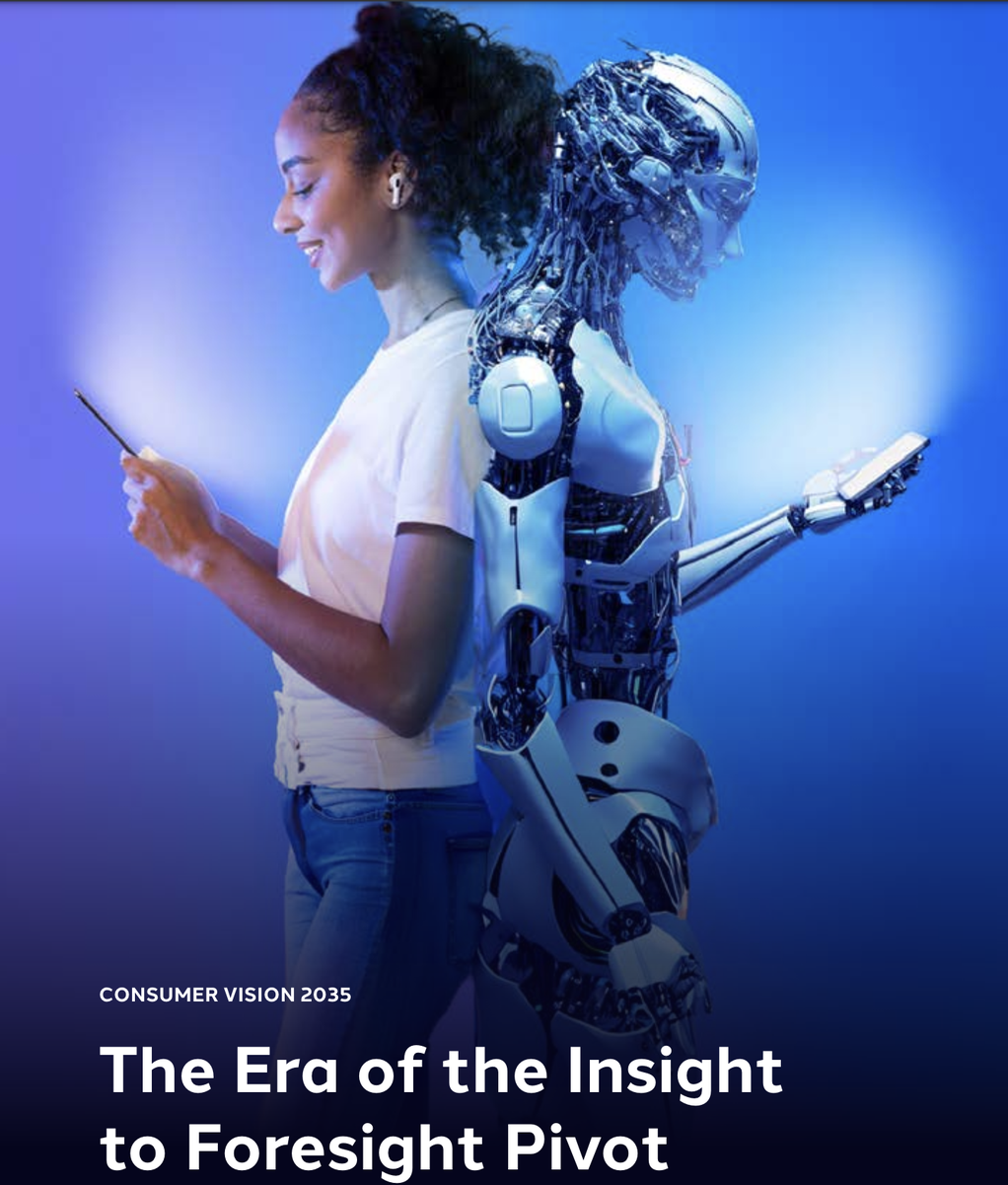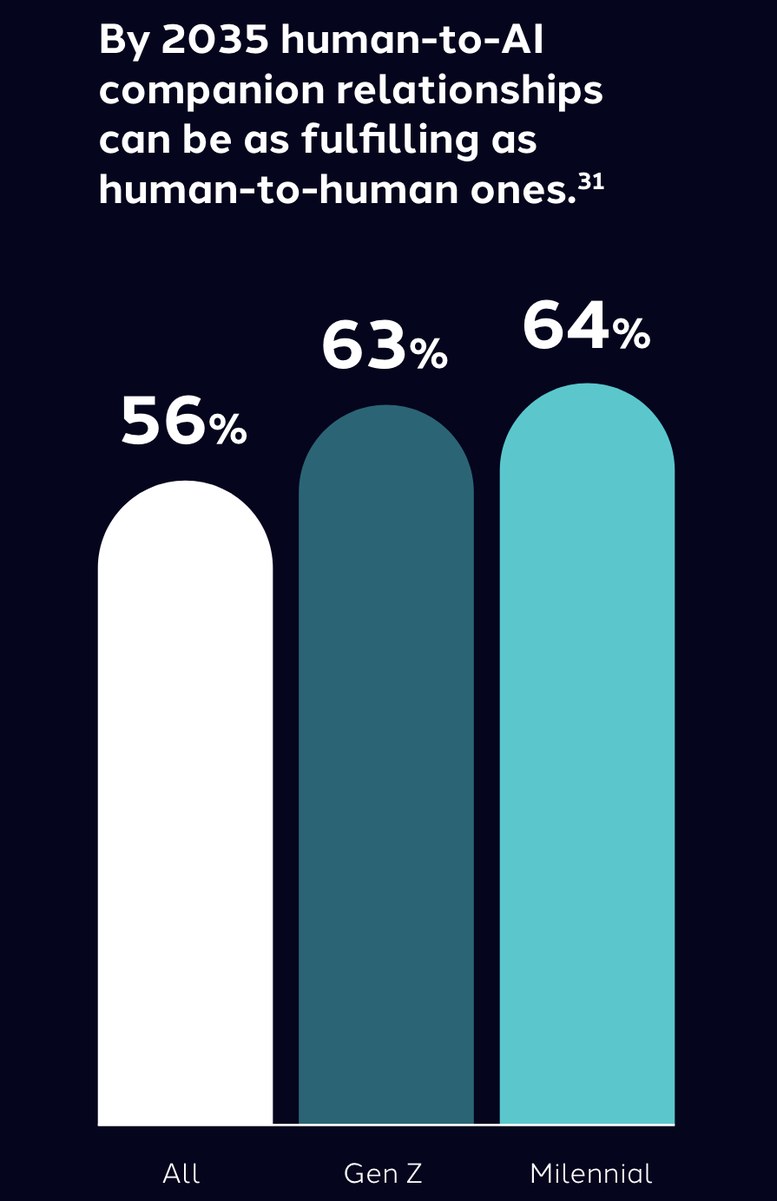
That's what Interpublic's Momentum Worldwide
unit found when it asked a global sample of consumers how they feel about the prospect of having relationships with AI companions.
While the overwhelming majority (93%) of global citizens told Momentum they "encounter difficulty making new friends or joining new communities," most (66%) would rather remain single than "resort
to companionship with an AI."
That said, Momentum also found slightly less than half (46%) of people are "open to an AI or augmented reality companionship" at some level.
The findings
are interesting for several reasons, especially the fact that a major global agency is even asking these questions.
But coming days after OpenAI's aborted effort to launch an AI voice assistant replicating "Samantha," the character actress Scarlett
Johansson voiced in the movie "Her" about a sad sack who falls in love with his AI assistant, it seems to be an inevitable, self-fulfilling goal of AI developers.
advertisement
advertisement
At the very least, we all
now know that OpenAI chief Sam Altman is still Spikejonzing for a Samantha in his life.
I've asked Interpublic for a copy of the study so I can dig into the relevance for the ad industry
myself, but the release the holding co put out gives some clue, albeit in obligatory trade rhetoric, noting:
"Consumers identified how brands can help bridge the gap with
making real connections. Eighty three percent expressed a higher appreciation for brands that promote genuine connections with communities. Brands who foster connections are rewarded; 75% feel a sense
of belonging by connecting with fellow fans of the same brand. Eighty percent find brands encouraging consumer connections show they prioritize consumer wellbeing," Interpublic explains in a release
sent to shareholders and the press this morning.
In other words, Interpublic is telling brand marketers: It's not AI companions, it's about what we can do for brand marketers.
"Momentum can help brands understand and embrace these learnings, positioning marketers to better meet the needs of today's consumers," Interpublic asserts.
Interestingly, the Interpublic
report comes just two days after another major holding company -- Dentsu -- also released a new report on how technology, consumers and branding relationships will change over the next ten years.
The Dentsu report, "The Era of the Insight to Foresight Pivot," doesn't focus exclusively on the disruption created by AI -- it also
addresses disruptors like the climate crisis, Web3, mixed reality, etc. -- but it is the primary one.
In fact, the 57-page report references AI or "artificial intelligence" nearly 150 times.
Like Interpublic's Momentum's findings, it also discusses the role of companionship, mentioning it five times, and predicting that by 2035, human-to-AI companion relationships will be "as fulfilling
as human-to-human ones," according to more than half (56% of all surveyed) of consumers (with the index rising for GenZ and Millennials).

"The prospect of a potential loneliness epidemic – as stated by the
World Health Organization 30 - will drive growing interest and comfort levels among consumers in digital companionship," Dentsu's experts opine in the report, noting: "Already, nearly half (47%) of
global consumers are interested in an AI friend they could talk to for advice or companionship. Furthermore, pushing the perspective forward to 2035 consumers believe that relationships with AI
companions could be as fulfilling and rewarding as the relationships they have with other humans today."
In fact, Dentsu seems more sure about the potential of AI companionship than
Interpublic's findings suggest. But unlike Interpublic, Dentsu doesn't tout the role ad agencies can play in maintaining human consumer-to-brand relationships, per se.
Dentsu's report is dense
with insights, predictions and recommendations related to an emerging "loneliness crisis," addressing issues such as "the siloed self," and even offering an antidote:
"Consumers’
eccentricity will manifest in a recalibration of how they go about forming connections and relationships compared to today," the report notes, adding: "While a global average of 27% of consumers feel
at personal risk of loneliness, this is playing out quite differently among generations., rising to 40% among Gen Z.
"More activities and rituals previously done alone will have the option to
be performed together, allowing consumers to multi-task connection and meet personal goals. In the future, we may even see doctors advise social activities as prescriptive measures. Some brands are
already simulating connection, such as Tokyo’s Tomodachi ga Yatteru Café which trains employees (many of whom are aspiring professional actors) to act as familiar friends to anyone who
enters."